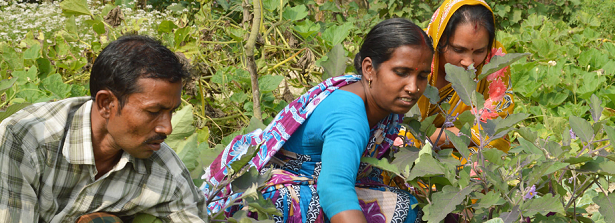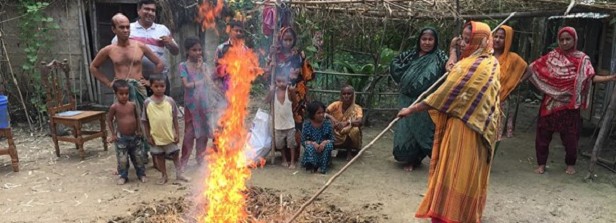Scaling-Up “Biochar-Urine Nutrient Cycling for Health” in Bangladesh (BUNCH2Scale)

Duration: 01 January 2017 to 31 December 2019
Project information
Aim: This project aims to assess the benefits of biochar-urine fertilizer to improving year-round food security and diets among vulnerable small-scale farmers in rural Bangladesh, in particularly women and young children, when implemented at scale. In Bangladesh, 35% of children are chronically undernourished and their diets deficient in vitamins and minerals. Homestead gardening can provide a source of fresh fruit and vegetables to enrich diets. However, land for gardening is often not very fertile and commercial mineral fertilizers are expensive and difficult to dose. Urine is a highly efficient fertilizer, but underused because of odour. Biochar is a porous material with highly adsorptive properties that can soak up urine and transform it into an odourless solid fertilizer that increases soil organic matter, biological activity and water-holding capacity. It can be produced from crop waste in soil-pit kilns at village level. BUNCH2Scale will work with farmers to scale up biochar-based organic fertilizer production to 48 villages in rural Bangladesh. Collaborating with local NGO field workers and research institutions, the project will evaluate the potential of this novel method for improving soils and increasing garden production.
Objectives: The novel biochar-urine technology has the potential to contribute to the following objectives:
- Increasing soil fertility and productivity in home gardens, leading to higher food security, dietary
diversity, micronutrient intake and improved nutrition and health; - Empowering women through earning a small income from sale of surplus garden produce;
- Reducing production costs for poor households through replacing expensive mineral fertilizer;
- Increasing farm resilience in a changing climate with weather extremes by enabling small-scale farmers to make the most of their land and diversify their crop production; and
- Contributing to climate change mitigation through a reduction in inorganic fertilizer use and through sequestering carbon in the soil.
Method: The study will take place within the Food and Agricultural Approaches to Reducing Malnutrition (FAARM) project, in which Homestead Food Production training is conducted in 1200 households in 48 villages over three years, organizing women into groups of 10-15. The biochar technology is being introduced to nine villages in 2016 to test feasibility. The proposed study “Scaling-Up Biochar-Urine Nutrient Cycling for Health” (BUNCH2Scale) will be conducted in all 48 intervention settlements within FAARM to enable a larger scale, more rigorous and longer-term assessment of the technology.
Country: Bangladesh.
Dutch policy goals: Eradicating existing hunger and malnutrition (‘people’); Promoting inclusive and sustainable growth in the agricultural sector (‘profit’); and Creating ecologically sustainable food systems (‘planet’).
Progress reports
Year 1: In Bangladesh, many children are undernourished with diets deficient in vitamins and minerals. Gardening can enrich diets, however, soil fertility is often low and commercial mineral fertilizers are expensive and difficult to dose. Biochar, made with crop waste in soil-pit kilns, is a porous material that transforms urine, an efficient but underutilized fertilizer, into an odourless solid fertilizer that increases soil organic matter, biological activity and water-holding capacity.
BUNCH2Scale works with farmers to scale up biochar-based organic fertilizer production to 48 villages in rural Bangladesh through a user-centric system. We are evaluating the fertilizer’s ability to improve soil and increase yield through a collaboration with local NGO field workers and research institutions. Preliminary field trials indicate a yield benefit of around 100%. A workshop will be held early next year to better understand the perceptions of the farmers for this new technology and to inform further dissemination activities across Bangladesh.

